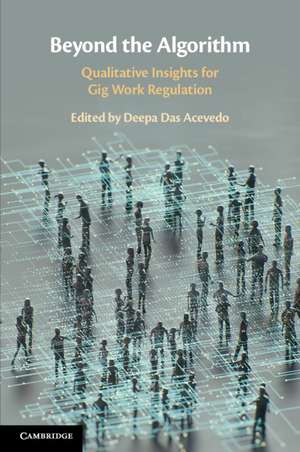Beyond the Algorithm: Qualitative Insights for Gig Work Regulation
Editat de Deepa Das Acevedoen Limba Engleză Paperback – 14 apr 2021
| Toate formatele și edițiile | Preț | Express |
|---|---|---|
| Paperback (1) | 282.26 lei 6-8 săpt. | |
| Cambridge University Press – 14 apr 2021 | 282.26 lei 6-8 săpt. | |
| Hardback (1) | 723.42 lei 6-8 săpt. | |
| Cambridge University Press – 4 noi 2020 | 723.42 lei 6-8 săpt. |
Preț: 282.26 lei
Nou
Puncte Express: 423
Preț estimativ în valută:
54.01€ • 55.72$ • 45.07£
54.01€ • 55.72$ • 45.07£
Carte tipărită la comandă
Livrare economică 26 martie-09 aprilie
Preluare comenzi: 021 569.72.76
Specificații
ISBN-13: 9781108738057
ISBN-10: 1108738052
Pagini: 235
Dimensiuni: 152 x 232 x 12 mm
Greutate: 0.32 kg
Editura: Cambridge University Press
Colecția Cambridge University Press
Locul publicării:New York, United States
ISBN-10: 1108738052
Pagini: 235
Dimensiuni: 152 x 232 x 12 mm
Greutate: 0.32 kg
Editura: Cambridge University Press
Colecția Cambridge University Press
Locul publicării:New York, United States
Cuprins
1. The rise and scope of gig work regulation Deepa Das Acevedo; 2. An Uber ambivalence: employee status, worker perspectives, and regulation in the gig economy V. B. Dubal; 3. Invisible work, visible workers: visibility regimes in online platforms for domestic work Alexandra Mateescu and Julia Ticona; 4. The importance of qualitative research approaches to gig economy taxation Shu-Yi Oei and Diane M. Ring; 5. Just a gig? Sharing economy work and the implications for career trajectory Alexandrea J. Ravenelle; 6. Algorithmic management, employment, and the self in gig work Julia Tomassetti; 7. Regulating transportation systems without authority (or data): plugging an Uber- and Lyft-sized hole in city transportation planning and policy Zak Accuardi; 8. Words matter: how tech media helped write gig companies into existence Sam Harnett; 9. Rewriting the rules: gig companies' drive for labor deregulation Rebecca Smith and Maya Pinto; 10. What regulators could gain by listening to Rideshare drivers Harry Campbell; Index.
Recenzii
'Even approximately a decade into the modern 'gig economy,' many of us are still trying to grasp the basic contours of this phenomenon. Beyond the Algorithm takes us to the next level of understanding. What we can take away from its multidisciplinary approach is a more richly textured appreciation of how the nature of work is changing.' Sharon Block, Harvard Law School
'This superb collection provides an exceptionally rich and multifaceted treatment of gig work. Each chapter makes a focused contribution, yet together they range from driving to carework, from tax compliance to contract theory, from data access to media discourse. A must-read for empirically-grounded policymaking and legally-informed qualitative research.' Noah D. Zatz, UCLA School of Law
'… Beyond the Algorithm provides a valuable supplement to what is known about the plights facing gig workers … a useful resource for ethnographers who want to understand the economic, regulatory, and ethical challenges facing today's gig laborers and to play a part in the development of policies and laws that address them.' Emanuela Guano, Society for the Anthropology of Work
'… this book does succeed in providing creative, rigorous, valuable and important empirical insights through its thought-provoking combination of empirical and legal analyses by academics and observers or participants in the gig economy. The book is written in an understandable manner and is very informative, comprehensive and of high quality, enriching the discussion on gig economy. The book is particularly relevant for researchers, social partners and policymakers that are seeking comparative information, but is recommended also to a wider range of readers, interested in understanding a bit about the work lives of the people who comprise the gig economy in the US.' Primož Rataj, European Journal of Social Security
'… this book will provide many valuable insights and points of departure for future research … the book draws upon a diverse range of contributors from the disciplines of law and sociology in addition to non-academic gig economy experts from nonprofits and the media.' Alex Wood, ILR Review
'This superb collection provides an exceptionally rich and multifaceted treatment of gig work. Each chapter makes a focused contribution, yet together they range from driving to carework, from tax compliance to contract theory, from data access to media discourse. A must-read for empirically-grounded policymaking and legally-informed qualitative research.' Noah D. Zatz, UCLA School of Law
'… Beyond the Algorithm provides a valuable supplement to what is known about the plights facing gig workers … a useful resource for ethnographers who want to understand the economic, regulatory, and ethical challenges facing today's gig laborers and to play a part in the development of policies and laws that address them.' Emanuela Guano, Society for the Anthropology of Work
'… this book does succeed in providing creative, rigorous, valuable and important empirical insights through its thought-provoking combination of empirical and legal analyses by academics and observers or participants in the gig economy. The book is written in an understandable manner and is very informative, comprehensive and of high quality, enriching the discussion on gig economy. The book is particularly relevant for researchers, social partners and policymakers that are seeking comparative information, but is recommended also to a wider range of readers, interested in understanding a bit about the work lives of the people who comprise the gig economy in the US.' Primož Rataj, European Journal of Social Security
'… this book will provide many valuable insights and points of departure for future research … the book draws upon a diverse range of contributors from the disciplines of law and sociology in addition to non-academic gig economy experts from nonprofits and the media.' Alex Wood, ILR Review
Descriere
Qualitative empirical research reveals that the narratives and real-life experiences defining gig work have concrete implications for law.
